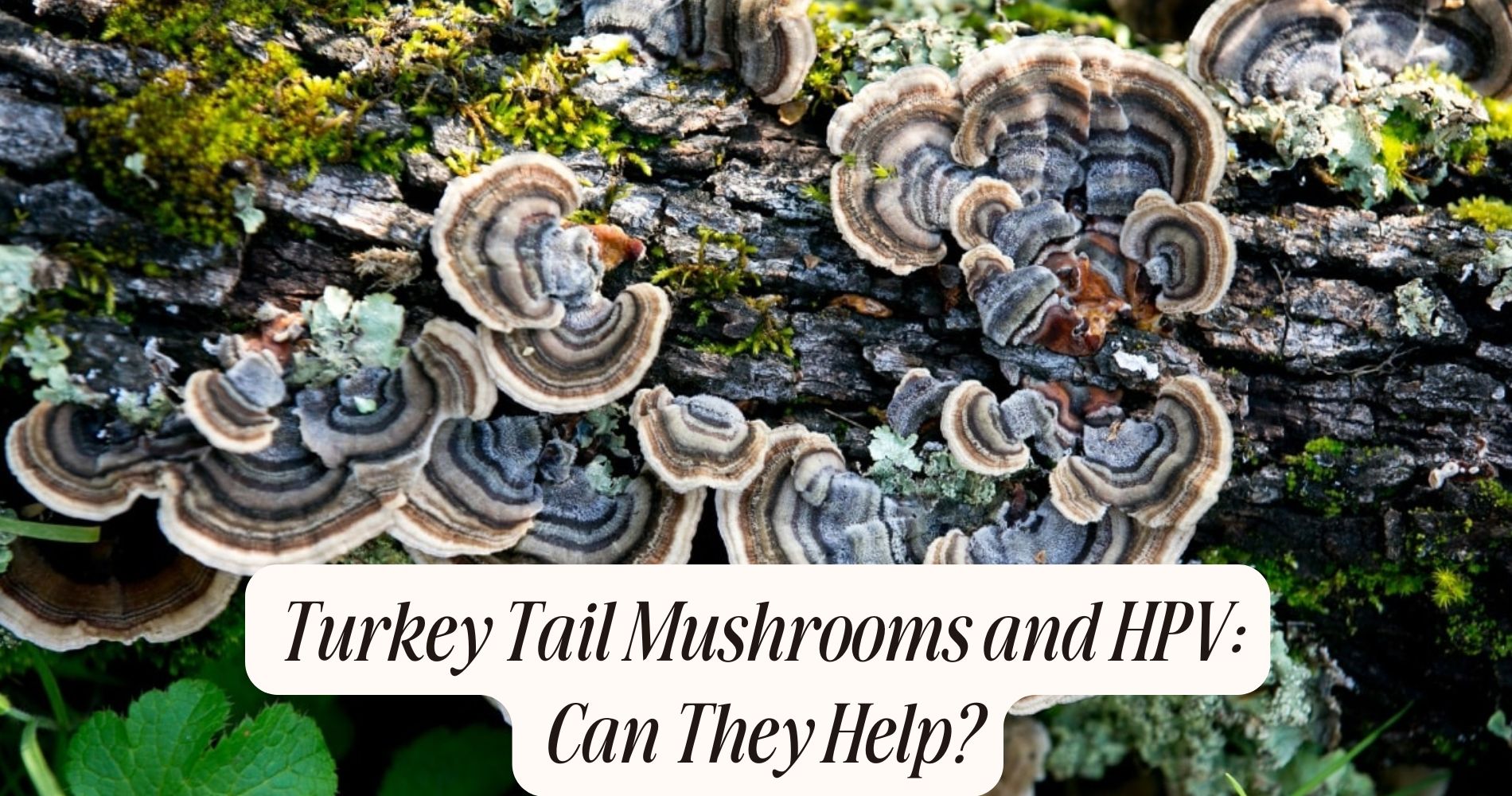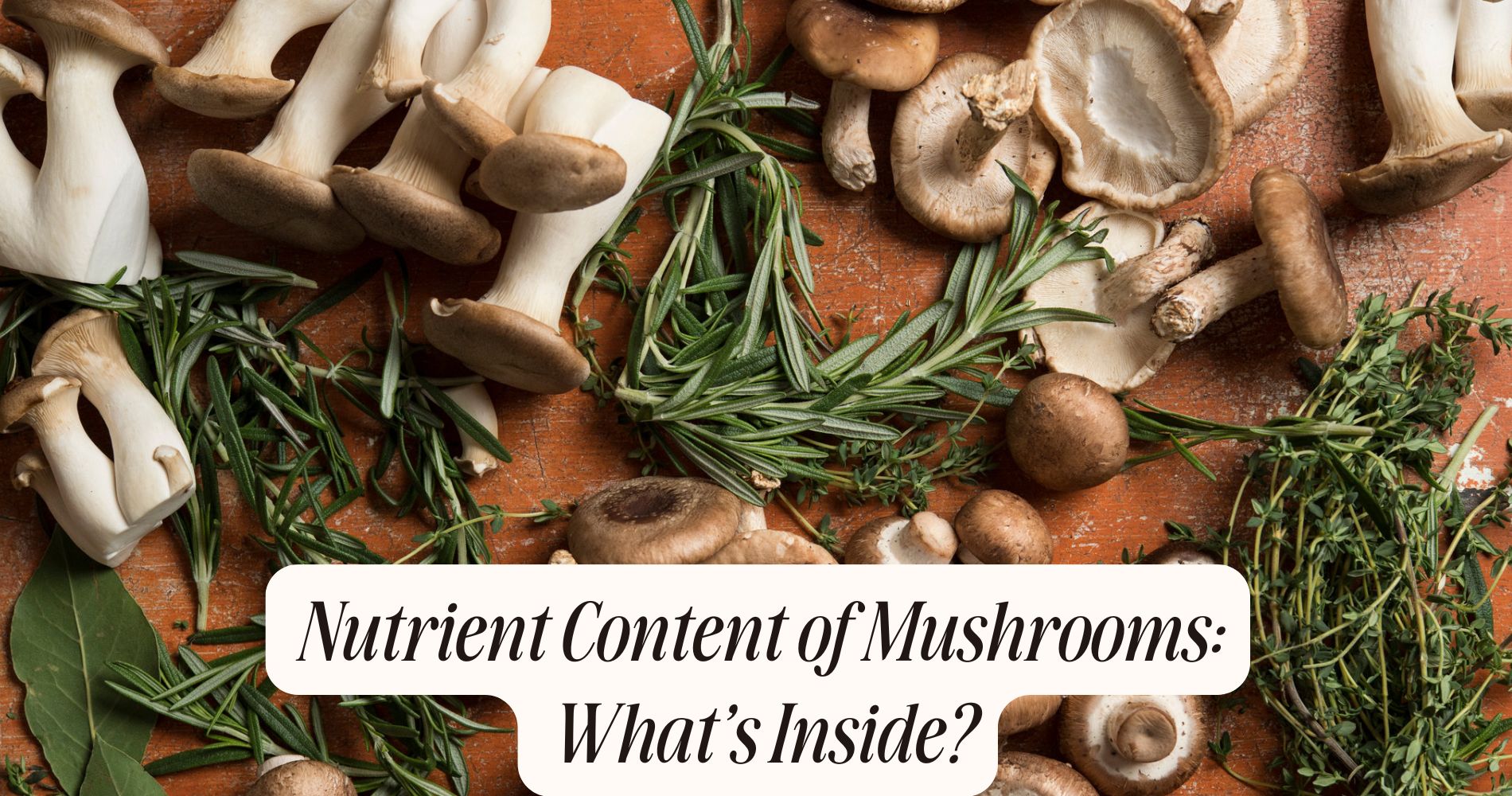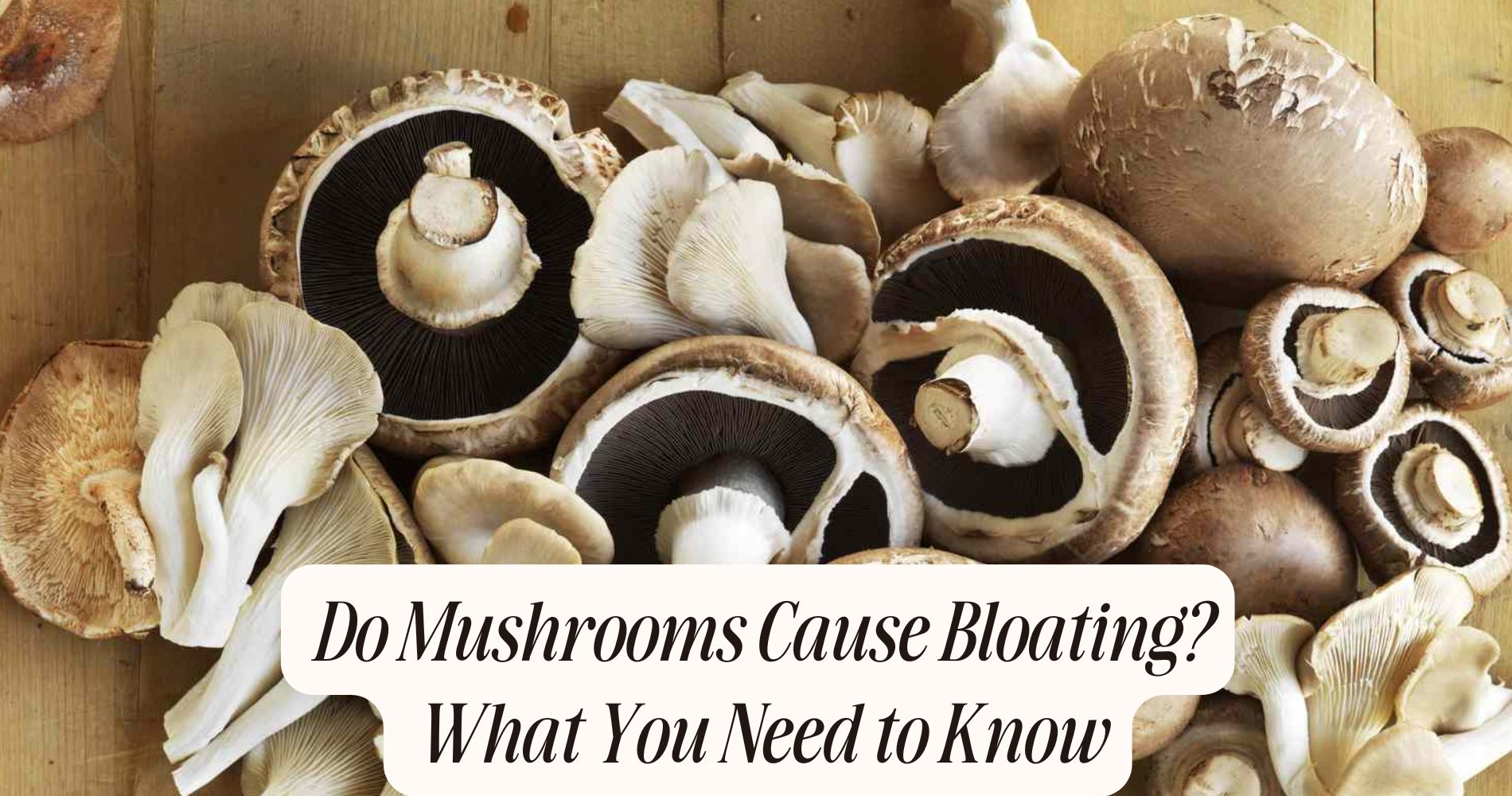
Turkey Tail Mushrooms and HPV: Can They Help?
Turkey tail mushrooms and HPV have been a growing area of research due to the immune-boosting properties of their polysaccharopeptides (PSP) and polysaccharide-K (PSK). These bioactive compounds support immune modulation by enhancing T-cell activity and cytokine production, potentially helping the body combat HPV infections. While traditional treatments focus on symptom management, early studies suggest that turkey tail mushrooms may aid in reducing viral loads. Ongoing research continues to explore their role in HPV support, offering a promising natural approach alongside existing therapies.
Understanding Turkey Tail Mushrooms
Turkey tail mushrooms, scientifically known as Trametes versicolor, are a type of fungus recognized for their distinctive layered appearance resembling a wild turkey's tail.
You'll find these mushrooms widely distributed across temperate forests, thriving on decaying hardwood logs. Their medicinal properties have been documented in traditional medicine systems, particularly within Asian cultures.
The bioactive compounds in turkey tail, such as triterpenoids, have drawn scientific interest for their potential health benefits. These compounds exhibit antioxidative and immunomodulatory activities, contributing to the mushroom's therapeutic profile.
Current research supports their role in enhancing immune function, suggesting they might assist in combating various ailments. When considering turkey tail, focus on its evidenced capacity to support health, guided by ongoing scientific inquiry and clinical validation.

The Science of Polysaccharopeptides
When exploring the science of polysaccharopeptides, you'll uncover their critical role within turkey tail mushrooms.
These bioactive compounds are characterized by their unique polysaccharopeptide structure, comprising a complex arrangement of polysaccharides bonded with peptides. Such a configuration facilitates immune modulation, a key function in enhancing the body's defense mechanisms.
Research indicates that these structures interact with immune cells, specifically targeting receptors that regulate immune responses. By doing so, they modulate immune activity, potentially boosting the body's ability to respond to pathogens like HPV.
Studies have shown that polysaccharopeptides can increase the proliferation of T-cells and macrophages, critical components of the immune system. This scientific evidence supports their potential therapeutic applications, highlighting their significance in the study of turkey tail mushrooms.
Immune-Boosting Properties of Turkey Tail
Renowned for their immune-boosting properties, turkey tail mushrooms possess bioactive compounds that considerably enhance the immune system's efficacy.
These fungi contain polysaccharides like polysaccharopeptides (PSP) and polysaccharide-K (PSK), which are integral in modulating the immune response. By stimulating the production of cytokines, they enhance the activity of natural killer cells and macrophages, thereby fortifying your body's defense mechanisms.
Incorporating turkey tail mushrooms into your regimen as herbal remedies can considerably elevate your immune surveillance.

Scientific studies demonstrate their efficacy in bolstering the immune system, offering potential protection against infections and diseases.
These mushrooms, with a rich history in traditional medicine, offer a natural approach to optimizing your immune function, backed by rigorous scientific research and evidence-based findings.
Overview of Human Papillomavirus (HPV)
Human Papillomavirus (HPV) represents one of the most prevalent sexually transmitted infections globally, affecting millions each year.
You've likely encountered the term HPV in conversations about sexual health. This virus transmits primarily through intimate skin-to-skin contact, encompassing vaginal, anal, or oral intercourse.
Importantly, HPV transmission methods don't always require penetrative sex, as the virus can spread through other forms of genital contact.
Once contracted, HPV symptoms can vary greatly. Most HPV infections remain asymptomatic, silently persisting without causing noticeable signs.
However, certain HPV strains lead to clinical manifestations like genital warts or, more seriously, cervical, anal, or oropharyngeal cancers.
The diversity in symptomatology underscores the importance of understanding HPV's clinical implications and the necessity for preventive measures, including vaccination and safe sexual practices.
Current Treatments for HPV
While there's currently no cure for HPV itself, various treatments target its symptoms and complications, enhancing patient outcomes.
The HPV vaccines, such as Gardasil and Cervarix, play an important role in preventing infection by high-risk HPV strains associated with cervical cancer. These vaccines are most effective when administered prior to the onset of sexual activity.
For existing infections, treatment focuses on managing symptoms like genital warts and precancerous lesions. Techniques include cryotherapy, surgical excision, and topical agents like imiquimod.
Additionally, natural therapies, though not clinically proven, appeal to some for symptom management, emphasizing a holistic approach.
Regular screening, such as Pap smears, is essential for early detection and intervention, greatly reducing the risk of HPV-related cancers.
Turkey Tail Mushrooms in Traditional Medicine
Turkey tail mushrooms, scientifically known as Trametes versicolor, have long been integral to traditional medicine systems, particularly in Asia.
In traditional Chinese medicine, they're prized for their immunomodulatory properties. These mushrooms are used for their potential to enhance qi, or life force, and bolster immune response.
In Japan, they're called kawaratake and hold cultural significance; they're incorporated into therapies for their perceived ability to restore balance and health.

Scientific investigations corroborate some traditional uses, identifying polysaccharopeptides such as PSP and PSK, which exhibit immunostimulatory activity.
These compounds have garnered attention for their potential therapeutic applications, aligning with historical practices.
Research Linking Turkey Tail to HPV Management
Emerging research suggests that Trametes versicolor may play a role in managing HPV infections, offering a promising avenue for therapeutic intervention.
Studies indicate that the polysaccharide-K (PSK) found in Turkey tail mushrooms exhibits immunomodulatory properties, which could enhance HPV prevention strategies.
Researchers have conducted in vitro and in vivo studies to evaluate Turkey tail efficacy, showing that PSK may boost immune response, potentially leading to reduced viral load and improved HPV clearance rates.
These findings underscore the importance of further clinical trials to establish dosage and long-term effects.
Potential Benefits and Mechanisms of Action
Trametes versicolor, commonly known as Turkey tail mushrooms, offers potential benefits through its bioactive compound, polysaccharide-K (PSK).
PSK is recognized for its role in immune modulation, enhancing your body's defense mechanisms against pathogens, including human papillomavirus (HPV). By stimulating macrophages and natural killer cells, PSK bolsters the immune response, potentially inhibiting viral proliferation.
Additionally, PSK contributes to cancer prevention by inducing apoptosis and inhibiting metastasis in malignant cells. It has been studied as an adjuvant in cancer therapy, demonstrating efficacy in reducing tumor growth.
Clinical trials have highlighted PSK's ability to improve survival rates in cancer patients, further underscoring its therapeutic potential.
Incorporating Turkey tail mushrooms might offer a complementary approach to support your immune health and mitigate cancer risks.
Considerations and Precautions
While Turkey tail mushrooms show promising health benefits, it's prudent to contemplate certain precautions when incorporating them into your regimen. Adhering to safety guidelines is essential to mitigate potential adverse effects.
Confirm proper identification of the mushroom to avoid toxic variants. Consult a healthcare professional for personalized dosage recommendations, as self-dosing can lead to suboptimal outcomes or interactions with existing medications.
Clinical data suggest a daily dosage typically ranging from 1 to 3 grams of dried mushroom or equivalent extract. However, individual tolerance levels vary, necessitating professional guidance.
Pay attention to potential allergic reactions and gastrointestinal disturbances, which are rare but possible. Prioritize reputable sources for your mushroom supplements to guarantee purity and potency, thereby safeguarding your health regimen.

Future Directions in Turkey Tail Research
As research on Turkey tail mushrooms progresses, scientists are poised to explore several promising avenues that could expand our understanding of their therapeutic potential.
Future research will likely focus on elucidating the bioactive compounds responsible for antiviral and immunomodulatory effects. You'll see studies aimed at optimizing extraction methods to enhance these properties.
Additionally, clinical applications could be examined through rigorous trials evaluating efficacy in HPV-infected populations. Researchers are expected to investigate potential synergistic effects when Turkey tail is combined with conventional therapies.
Furthermore, genomic studies might reveal genetic markers that predict individual responses, paving the way for personalized medicine approaches.
These directions will provide critical insights, potentially transforming Turkey tail mushrooms into a significant asset in integrative medicine.
Elevate Your Wellness with SUPER MUSHROOM GUMMIES
Looking for an effortless way to enjoy the benefits of functional mushrooms? SUPER MUSHROOM GUMMIES by Well Gummies make it simple. Packed with 10 powerful mushroom varieties, including turkey tail, these delicious wild berry-flavored gummies help boost immunity, enhance focus, and support overall wellness—all without the hassle of powders or capsules. No jitters, no crash—just natural energy and clarity to keep you shining all day. Try them today and fuel your body the easy way!
Frequently Asked Questions
Can Turkey Tail Mushrooms Be Consumed Alongside Conventional HPV Treatments?
You can consume turkey tail mushrooms alongside conventional HPV treatments. Their benefits include immune modulation and antioxidant properties. However, consult your healthcare provider, as evidence-based integration guarantees synergy without compromising the efficacy of medical interventions.
Are There Any Known Side Effects of Turkey Tail Mushrooms?
You're considering turkey tail mushrooms for immune support, but it's essential to follow dosage recommendations. Potential side effects include gastrointestinal discomfort and allergic reactions. Always consult healthcare professionals for evidence-based advice tailored to your health needs.
How Are Turkey Tail Mushrooms Typically Consumed for Health Benefits?
You typically consume turkey tail mushrooms for health benefits as turkey tail tea or mushroom tinctures. Evidence-based studies suggest these forms enhance bioavailability, ensuring ideal absorption of polysaccharides, which may support immune modulation. Follow dosage recommendations precisely.
Do Turkey Tail Mushrooms Interact With Prescription Medications?
You're wondering about drug interactions with turkey tail mushrooms. While research is limited, it's essential to consult healthcare providers to guarantee medication safety. Potential interactions may occur, affecting the efficacy of your prescription medications. Always prioritize professional guidance.
Where Can I Purchase High-Quality Turkey Tail Mushroom Supplements?
You can purchase high-quality turkey tail mushroom supplements from reputable online retailers or specialized health stores. Verify the product is standardized, contains polysaccharides, and has undergone third-party testing for purity and potency to guarantee safety and efficacy.
Conclusion
Incorporating turkey tail mushrooms into your regimen could offer promising adjunctive benefits for managing HPV, thanks to their polysaccharopeptides, which enhance immune function. Scientific studies indicate that these compounds might support your body's ability to combat HPV-related symptoms. However, it's essential to consult healthcare professionals before beginning any supplementation, as individual responses vary and research is ongoing. Future studies should further elucidate the specific mechanisms and ideal dosages to maximize therapeutic outcomes effectively.




